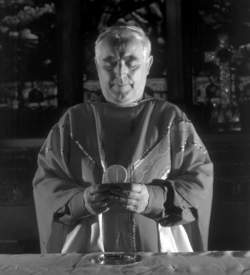sacrament
Sacrament
(religion, spiritualism, and occult)Augustine (354-430 CE) was the first to officially define the word sacrament, and his definition has stood the test of time. He said it was "an outward and temporal [visible] sign of an inward and enduring grace."In other words, a sacrament incorporates visible symbols that illustrate an invisible work of God. One example is baptism (see Baptism), which uses water to illustrate the theological premise that God "washes away" sin.
But some theological explanations go deeper than what is suggested by the word "illustrate." Some religions teach that the actual act, using the visible symbol, is what triggers the inward reality. In the case of baptism, for example, there are those who believe that without the outward act of cleansing, the inward reality never happens. In other words, if you are not baptized with water according to the rituals of the particular sect, you are not "saved."
Early on, the Roman Catholic Church recognized seven specific sacraments. Most Protestant denominations recognize only baptism and the Lord's Supper as sacraments. But even within these communities there is often disagreement as to the meaning, extent, and outward presentation of each sacrament.
Sacrament
in Christianity, a magical religious rite; according to church teachings, a sacrament gives a person a supernatural miracle-working power (“divine grace”).
The origins of the sacraments go back to the pre-Christian mysteries. The sacraments were gradually introduced with the establishment and strengthening of the Christian church organization. The first sacraments mentioned in Christian literature were baptism and the Eucharist (end of the first to the second century, Epistles of the Apostles, Acts of the Apostles).
In the 13th century (definitively at the Council of Florence of 1438–45), the Roman Catholic and the Eastern Orthodox churches adopted seven sacraments: (1) baptism, which is administered to a person as a sign of acceptance into the church and to cleanse the person of alleged sins (in the Orthodox tradition it is administered by immersing an infant in water, in the Catholic tradition by pouring water, and in the Protestant tradition by sprinkling water); (2) confirmation (Roman Catholic) or anointing (Eastern Orthodox), by which a person is “sanctified” by being anointed with an aromatic mixture (chrism); (3) Eucharist, by which, according to Christian teachings, believers receive the body and blood of Christ and in so doing free themselves of sins (in the Orthodox Church both laymen and clergy partake of bread and wine, and in Catholicism the clergy take bread and wine and laymen, as a rule, only partake of the bread); (4) penance (confession), the disclosing of one’s sins to a priest and receiving absolution (“remission of sins”) in the name of Christ; (5) matrimony (in the Catholic Church this cannot be dissolved); (6) extreme unction, or anointing of the sick, which is administered to a sick person (according to Orthodox teaching it cures illnesses, and in Catholicism it is a blessing over a dying person); and (7) holy orders, which is administered by a bishop, admits a person into the priesthood (the sacrament formed with the rise of a clergy).
The sacraments can be administered, as a rule, only by a member of the clergy who acts, according to church teachings, as an intermediary between god and people. Thus, the church teachings about the sacraments served to lay the foundation for the necessary existence of ministers of worship and the church.
The sacraments underwent some changes in the Protestant teachings of the Reformation period. Lutherans recognize only the sacraments of baptism and the Eucharist (Luther originally recognized the sacrament of penance as well), and the Anglican Church recognizes baptism, the Eucharist, and matrimony. Baptists and members of the Reform Church retained the rites of baptism and the Eucharist, but they see them as symbolic acts rather than as sacraments. In the papal encyclical Mysterium fidei (1966), Pope Paul VI made a stricter observance of the sacraments mandatory, especially the sacrament of the Eucharist. (At the same time, some relaxation in respect to the form of observance was allowed.) In modern Protestantism there is a tendency to emphasize the meaning of the sacraments as a means of strengthening religious faith.
REFERENCES
Ranovich, A. Proiskhozhdenie khristianskikh tainstv. Moscow-Leningrad, 1931.Emeliakh, L. I. Proiskhozhdenie khristianskikh tainstv. Moscow, 1956.
B. IA. RAMM
